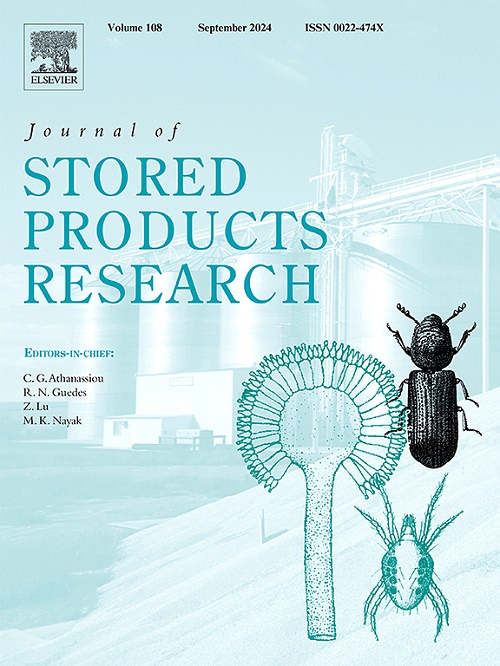Influence of conditions and packaging materials on physiological quality parameters of wheat seeds during storage
IF 2.7
2区 农林科学
Q1 ENTOMOLOGY
引用次数: 0
Abstract
Wheat belongs to the genus Triticum under the Poaceae family and plays a vital role in food and nutritional security. High-quality, vigorous seeds ensure ideal plant populations and better combat early abiotic and biotic challenges. This study evaluated the effects of storage conditions, containers, and packaging materials on the quality of wheat seeds over time. The experiment used a completely randomized design with three factors: temperature (ambient vs. controlled at 22 ± 1 °C), containers (desiccator vs. plastic container), and packaging (cloth, paper, PVC ziplock). Seed quality parameters, including germination, electrical conductivity, lipid peroxidation, and hydrogen peroxide content, were assessed. The results showed that seed quality declined gradually with storage time, but the effects of storage factors varied significantly. After six months, higher germination was observed in controlled temperature with desiccator storage, particularly in cloth (71%) and paper (71%) packaging. No germination was found in ambient conditions with plastic container storage for cloth and paper. Biochemical parameters indicated increased deterioration over time. Controlled temperature storage at 22 ± 1 °C was significantly better for maintaining high seed quality compared to ambient conditions. PCA and cluster analyses proved that desiccator storage was more effective than plastic container, and PVC ziplock packaging also outperformed cloth and paper particularly under ambient conditions. These findings highlight the importance of optimizing storage conditions to preserve wheat seed quality and viability during prolonged storage.
求助全文
约1分钟内获得全文
求助全文
来源期刊
CiteScore
5.70
自引率
18.50%
发文量
112
审稿时长
45 days
期刊介绍:
The Journal of Stored Products Research provides an international medium for the publication of both reviews and original results from laboratory and field studies on the preservation and safety of stored products, notably food stocks, covering storage-related problems from the producer through the supply chain to the consumer. Stored products are characterised by having relatively low moisture content and include raw and semi-processed foods, animal feedstuffs, and a range of other durable items, including materials such as clothing or museum artefacts.

 求助内容:
求助内容: 应助结果提醒方式:
应助结果提醒方式:


